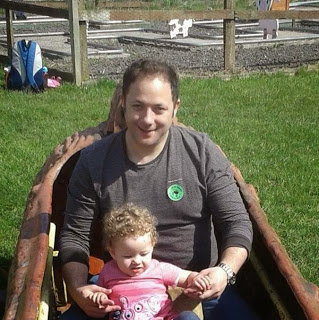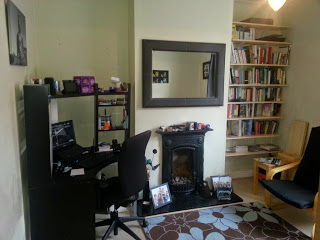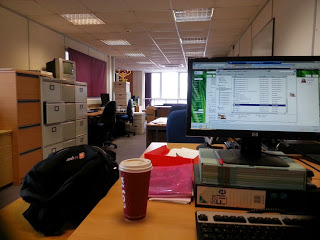I am Matthew Hanchard, and This is How I Work
 Today, I am interviewing Matthew Hanchard in the “How I Work” series. Matthew is a part-time, self-funded PhD candidate in Sociological Studies at the University of Sheffield. His research focuses on digital map practices in everyday life, combining digital sociology with cartographic theory, both grounded in qualitative primary research. Alongside his role as PhD, he works 37.5 hours a week on compressed hours (over 4 days) for the UK’s leading drug and alcohol misuse charity as a software developer, maintaining overall responsibility for the intranet and project managing software implementations (full cycle). He also has a 20 month old daughter called Penelope. He attributes juggling the three aspects of his life to good time-management, a great sense of humor, and trying to getting the work/life balance right.
Today, I am interviewing Matthew Hanchard in the “How I Work” series. Matthew is a part-time, self-funded PhD candidate in Sociological Studies at the University of Sheffield. His research focuses on digital map practices in everyday life, combining digital sociology with cartographic theory, both grounded in qualitative primary research. Alongside his role as PhD, he works 37.5 hours a week on compressed hours (over 4 days) for the UK’s leading drug and alcohol misuse charity as a software developer, maintaining overall responsibility for the intranet and project managing software implementations (full cycle). He also has a 20 month old daughter called Penelope. He attributes juggling the three aspects of his life to good time-management, a great sense of humor, and trying to getting the work/life balance right.
Current Job: IT Software Develop/SharePoint Administrator for the UK’s leading drug and alcohol misuse charity – 37.5 hours per week over 4 days + PhD (self-funded) Part-time (2 days a week)
Current Location: Derby, Derbyshire
Current mobile device: Samsung S3 and a Samsung Galaxy Tab3
Current computer: Acer Aspire 6930 (Laptop)
Can you briefly explain your current situation and research to us?
Parent to a 19 month old, work full-time, and I do my PhD on one weekday and one weekend day. My research covers digital maps as practised media entangled within social relations. I focus on how digital maps are used, and how that fits in with other social practices – to see if they anchor/order social life in any way e.g., does using Google Maps and Zoopla shape which homes you view when looking to buy a house.
What tools, apps and software are essential to your workflow?
At Work – SharePoint, Excel and InfoPath. On my PhD, Nvivo, Word, Google Drive and Twitter.
In the last couple of weeks I have also started using IFTTT and Pocket. I think it’s important to keep up to date with new technologies than can optimise time management, but I like to sit back and see how others’ in my social network find them first. I tried those two because Mark Carrigan had some good reviews of both. So I tried them. He is in my Twitter social network, and holds similar academic interests to me, but I have never met him in person. I guess some tools shift on a daily basis e.g. my University provides a Google account, so I use Google Drive where I used Dropbox before, and others are fixed in place (stabilised) through a social network – for me that’s LinkedIn (professional profile), Facebook (friends, family and more intimately known people), Twitter (public forum to share ideas and enter debate).
What does your workspace setup look like?
At work I have a desk. On my PhD I have an office room with desk, where my laptop sits in a permanent space.
 |
| PhD workspace |
 |
| Day job workspace |
What is your best advice for productive academic work?
Get some real-life work experience before entering academia. That way, you soon notice that it’s actually pretty easy to manage. Only those with little or no experience moan about how hard it is. Outside academia, workloads are far heavier – this may change when you’re a paid member of faculty.
How do you keep an overview of projects and tasks?
A1 size wall-planner which I update regularly (I have no means to combine my work and home calendars in digital format)
Besides phone and computer, do you use other technological tools in work and daily life?
I don’t use a phone for my research. That is a little presumptuous. I use books, map and SatNav.
Which skill makes you stand out as an academic?
Almost 10 years of project management. Having worked in teams that commission academic research as a day job. Awesome at networking
What do you listen to when you work?
If I am transcribing, I listen to the interview/focus group video. Otherwise I like soft music, without too many high or low notes which could distract me. Madeleine Peyroux is good.
What are you currently reading?
I read academic books in bed, because I have no other time. At the minute it is Castells ‘Internet Galaxy’, but I’m about to re-read Shove, Panzar and Watson’s Social Dynamics of Practice’.
Are you more of an introvert or extrovert?
Probably more introvert. It helps me deal with the isolation and solitude of a PhD. At work I often say things quietly and get over-spoken. Then my idea gets claimed by another.
What’s your sleep routine like?
Bad. My toddler has glue ear. I go to bed about 10.30pm and read for an hour. My alarm goes off at 6.00am. I have not had an uninterrupted night of sleep for almost 4 months.
What’s your work routine like?
I work best between about 10pm and 3am. No idea why. My lifestyle does not allow this, so Mon, Tue, Wed I go to work from 8am to 6pm. Friday I work from 8am to 5.30pm. Thurs and Sat I have a lie in until 8am and then work on my PhD from about 10am to 8pm, with a longer break at lunch.
What’s the best advice you ever received?
It’s a PhD, not a nobel prize; Good enough is good enough; it’s all or nothing; Sharing best practices just least to a lot of mediocre; Enjoy life while you can, nobody ever thinks they are just about to die!

good to hear your routine. I too am trying to manage married life with two young kids, full time employment and doing a self funded PhD part-time. I'm struggling to get through primary and secondary readings at the moment to write up 2 or 3 Lit Review chapters. My research is in the area of Domestic Photography and society… any tips on staying focused and not drifting would be of great benefit. Looking for empathy as a fellow part-time scholar
Have you tried to work with the pomodoro technique? Maybe just 1 or 2 of these each night, to keep moving forward?